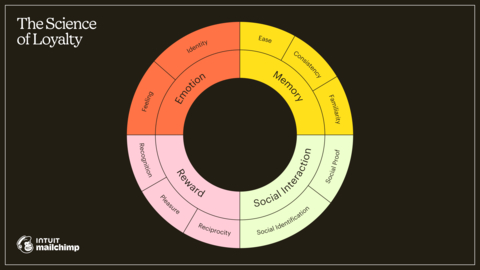The Science of Loyalty: Intuit Mailchimp’s New Global Study Uncovers Fundamental Drivers of Consumer Behavior and Decision-Making Towards Brand Loyalty
The study presents 12 actionable tactics brands and marketers can take to build loyalty with their customers

The Loyalty Wheel framework established in Intuit Mailchimp's latest report, The Science of Loyalty, distills loyalty into four neurobiological principles: reward, memory, emotion, and social interaction. These fundamental pillars of loyalty can be broken down into 10 behavioral elements that help us understand the scientific underpinnings of loyal actions. (Graphic: Business Wire)
“The Science of Loyalty” uncovered that as brands and marketers build stronger relationships with their existing customer base, those customers are significantly more likely to purchase from the brand again, a cost-effective solution to the rising costs and resources it takes to acquire new customers. Diving into science-backed loyalty strategies can assist brands and marketers with setting their brand apart from the competition. Approximately
“Loyalty is more important than ever,” said Michelle Taite, Chief Marketing Officer at Intuit Mailchimp. “In today’s ever-changing business landscape, characterized by overwhelming amounts of data and endless options, brands and marketers should be equipped with the tools and resources needed for marketing strategies that make an impact and build meaningful connections that drive loyalty with their customers."
The Commitment Spectrum
The report finds that loyalty falls on a spectrum. To better understand the types of loyal customers, Mailchimp created a commitment spectrum, which ranges from “inert” to “fandom” loyalty. Loyalty begins on an inert level, where consumers purchase from a brand not out of preference, but out of convenience. Moving up the spectrum, other loyalty categories include habitual loyalty, where loyalty emerges from routine rather than emotional ties, followed by dedicated loyalty, where consumers form an emotional connection to the brand's vision and purpose. What many brands and marketers view as the pinnacle of loyalty—fandom—is characterized by a strong emotional bond and shared values amongst the brand's community.
While inspiring fandom may be the goal for many brands and marketers, only
“I think a goal like loyalty, whereby people avoid better alternatives out of a sense of obligation or genuine passion, is phenomenally hard to achieve,” said Shotton. “The danger is that marketers overestimate their chances of achieving that and maybe convert their budget into smaller sales rather than [pursuing] the much, much simpler goal of habit.”
The 12 Tactics of Loyalty
To better understand the inner workings of loyalty, the report outlines “12 Tactics of Loyalty” to assist brands and marketers with building meaningful relationships with consumers.
-
Smart exposure: Be top-of-mind with strategically placed brand codes and symbols.
Almost half (46% ) of repeat purchasers said they know a lot about the brands they purchase from. This rises to60% among Fandom purchasers, who feel they know the brand best. -
Familiar foundations: Build familiarity by showing up in trusted spaces.
About half (49% ) of repeat purchasers said that recommendations from friends or family help them decide what to buy, rising to72% among 18-24 year olds. -
Choice validation: To encourage renewed commitment, help customers feel justified in their choice.
Only52% of inert customers and51% of habitual had a very favorable opinion of their preferred brand, but this rises to84% among fandom purchasers. -
New routines: Build repeat purchases into your customer’s routine.
Routines are powerful drivers of loyalty.35% of those who purchase on a daily or weekly basis said their preferred brand was the only one they’d consider (vs22% among those purchasing monthly or less). -
Smooth selling: Remove obstacles that could disrupt customers' shopping journey.
97% of repeat purchasers said their preferred brand makes it quick and easy to purchase. -
Easy decisions: Create friction-free experiences that combat choice fatigue.
47% of all email subscribers explore new product offerings through brand emails and39% went on to make a purchase after reading the message. -
Gift giving: Promote organic peer-to-peer marketing through gift giving.
Less than half (37% ) of customers have recommended their preferred brand to friends or family and only22% have given it as a gift, revealing an untapped opportunity for brands to spread the word. However, this increases among 18-24 year olds, of which43% have recommended their preferred brand to family and friends and30% have given it as a gift. -
Insider status: Help customers feel heard by asking for, and responding to, feedback.
The most popular method of contact is email with over half (57% ) of shoppers looking to keep in touch with brands this way. This is followed by SMS (17% ) and social media (17% ). If a brand can’t offer quality customer service across channels, 1 in 4 said they would consider switching brands. -
Meaningful rewards: Personalize reward programs with customer lifestyles to boost satisfaction.
While45% of repeat purchasers said they’d like their preferred brand to provide them with deals or discounts, rewards aren’t always about monetary incentives. In fact,87% said their preferred brand made them feel good, which was the second biggest driver of loyalty, after consistency. -
Game on: Gamify your rewards to foster a sense of achievement and fun.
29% of repeat purchasers said they’d like to receive loyalty reward perks from their preferred brand. However, currently only16% have joined a loyalty benefits program, suggesting untapped potential. -
Shared Interests: Build emotional resonance by aligning with a cultural niche or value.
1 in 4 (26% ) of consumers said they would consider switching brands due to environmental impact or unethical manufacturing, rising to34% among 18-24 year old shoppers. -
Sense Of Ownership: Actively engage consumers to foster a sense of co-collaboration.
Customers are keen to provide their thoughts and experiences to brands, with over 1 in 4 (29% ) email subscribers participating in surveys or feedback.
Why Brands and Marketers Should Care
Experts like Denise Lee Yohn, author of What Great Brands Do: The Seven Brand-Building Principles that Separate the Best from the Rest, describes loyalty as not just a marketing goal, but a comprehensive business strategy. In an era marked by choice-overload, loyalty is a strategic imperative for brands seeking sustainable growth and resilience. Marketers must be able to navigate the complex terrain of consumer behavior effectively and recalibrate their marketing strategies. Using the tactics outlined in the Strategic Loyalty Playbook, brands and marketers will be one step closer to engaging with customers in a holistic way and deepening relationships that positively impact their marketing goals.
To further explore loyalty— how it’s fostered, the role of trust, and how fandom factors into consumer behavior—head to Mailchimp Presents to check out our latest Loyalty Film Collection, featuring documentaries that celebrate the dynamics of loyalty.
All statistics from a Canvas8 conducted panel-sample online survey on behalf of Intuit Mailchimp February 17–27, 2024 consisting of 4,000 respondents (1000 from each of the US,
About Intuit Mailchimp:
Intuit Mailchimp is an email and marketing automations platform for growing businesses. We empower millions of customers around the world to start and grow their businesses with world-class marketing technology, award-winning customer support, and inspiring content. Mailchimp puts data-backed recommendations at the heart of your marketing, so you can find and engage customers across email, social media, landing pages, and advertising—automatically and with the power of AI. In 2021, Mailchimp was acquired by Intuit Inc. (Nasdaq: INTU), the global financial technology platform that makes Intuit TurboTax, Credit Karma, QuickBooks, and Mailchimp.
About Intuit:
Intuit is the global financial technology platform that powers prosperity for the people and communities we serve. With approximately 100 million customers worldwide using products such as TurboTax, Credit Karma, QuickBooks, and Mailchimp, we believe that everyone should have the opportunity to prosper. We never stop working to find new, innovative ways to make that possible. Please visit us at Intuit.com and find us on social for the latest information about Intuit and our products and services.
About Canvas8:
Canvas8 is an award-winning strategic insights practice operating out of
View source version on businesswire.com: https://www.businesswire.com/news/home/20240422270544/en/
Source: Intuit Inc.







